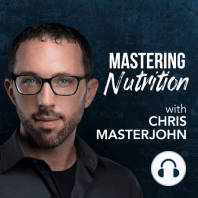22 min listen

Dietary Management of Heterozygous Familial Hypercholesterolemia (HeFH) | Mastering Nutrition #14
Dietary Management of Heterozygous Familial Hypercholesterolemia (HeFH) | Mastering Nutrition #14
ratings:
Length:
45 minutes
Released:
Jun 23, 2016
Format:
Podcast episode
Description
In this episode, I discuss dietary management of familial hypercholesterolemia (HeFH). This question was asked on the Facebook Live episode from 06/16/2016, "Ask Chris Masterjohn, PhD Anything About Heart Disease," but I was unable to get to the question within Facebook's time limit. Please note that HeFH is a medical issue and the purpose of this episode is not to diagnose or treat anyone with HeFH. This is educational in nature and the information should only be used to manage HeFH under supervision of a qualified health professional. Herein, I discuss why I believe the Kitavan diet should serve as an ancestral diet on which to model dietary management of HeFH. It is a low-fat, low-cholesterol, high-carbohydrate diet where most of the fat is highly saturated because it comes from coconut, some of it is is from fish, and where the carbohydrate mostly comes from starchy tubers but some comes from fruit. The best way to get to the root of the problem in heterozygous FH is to take the one working gene for the LDL receptor and try to bring it up to the expression level that would be found in someone without FH. This can be done by maximizing the biological activity of thyroid hormone (within the range considered euthyroid) and by maximally suppressing PCSK9 activity with the help of strong insulin signaling. These come down to managing good body composition and eating a low-fat, protein-adequate, micronutrient-adequate, high-carbohydrate diet. Restricting cholesterol may be helpful, but it also comes at the cost of cutting nutrient density, since some of the most nutrient-dense foods -- liver and egg yolks -- are also rich in cholesterol. Therefore, it should be #2 in the line of defense rather than #1. Replacing saturated fat with polyunsaturated fat and using statins should both be tools in the kit, but they should be tools much further down the line of resort because they are less related to the root of the problem and they may come at costs that compromise health and longevity.
Released:
Jun 23, 2016
Format:
Podcast episode
Titles in the series (100)
001: Coffee: Why I drink coffee and won't apologize for it, but why I'm skeptical of the large body of literature associating coffee consumption with reduced disease risk. Do we drink coffee by choice? Sort of. I discuss why our genes may play a role in our coffee... by Mastering Nutrition